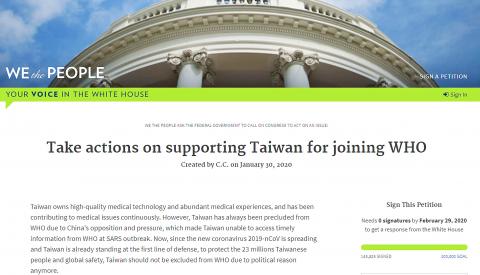The US Department of State and several prominent US politicians have criticized international organizations for excluding Taiwan amid a global effort to curb the spread of a new coronavirus.
The WHO on Thursday declared the virus a public health emergency of international concern, but did not permit Taiwan to attend emergency briefings about the virus even though there are 10 confirmed cases in the nation.
US senators, including Mitt Romney and Cory Gardner, said China has placed pressure on UN-related agencies, such as the WHO and the International Civil Aviation Organization (ICAO), as well as the International Criminal Police Organization (Interpol), to exclude Taiwan from discussions, and called instead for Taiwan’s immediate inclusion.

Photo: US White House Web site
Japan, Canada, the EU and other world powers in the past week have also renewed their support for Taiwan’s inclusion in the annual World Health Assembly, the WHO’s decisionmaking body, as an observer amid the outbreak.
The US State Department on Saturday criticized the ICAO for allegedly blocking users on Twitter who refer to Taiwan’s non-participation in the organization.
“Taiwan has a relevant and credible voice on transnational health issues, and the United States has long supported its active engagement in international venues, including ICAO, where its expertise can be beneficial,” US Department of State spokeswoman Morgan Ortagus said in a statement.
“We call upon ICAO to immediately and permanently reverse its practice of blocking discussion of Taiwan on its Twitter properties and make clear publicly its understanding that freedom of expression must always supersede the political insecurities of member states,” she said.
The ICAO denied blocking Twitter users.
In related developments, a petition submitted to a White House Web site that calls on the US to help Taiwan be included in the WHO has reached the required threshold to warrant an official response.
The petition, initiated on Thursday by someone identified only as “C.C.,” had collected more than 120,000 signatures as of 2pm yesterday.
According to the rules of the “We the People” Web site, a petition needs to gain at least 100,000 signatures within 30 days to obtain a White House review and response.
The White House says it usually gives a response within 60 days, but it could take longer, depending on the issue and the volume of petitions submitted.
The person who initiated the petition said Taiwan has “high-quality medical technology and abundant medical experiences and has been contributing to medical issues continuously.”
“However, Taiwan has always been precluded from WHO due to China’s opposition and pressure, which made Taiwan unable to access timely information from WHO at SARS outbreak,” the petition said.
Taiwan is standing “at the first line of defense” during the new coronavirus outbreak, so it should not be excluded from the WHO for political reasons, for the sake of Taiwan’s 23 million people and global safety, the petition added.

The Taiwanese passport ranked 33rd in a global listing of passports by convenience this month, rising three places from last month’s ranking, but matching its position in January last year. The Henley Passport Index, an international ranking of passports by the number of designations its holder can travel to without a visa, showed that the Taiwan passport enables holders to travel to 139 countries and territories without a visa. Singapore’s passport was ranked the most powerful with visa-free access to 192 destinations out of 227, according to the index published on Tuesday by UK-based migration investment consultancy firm Henley and Partners. Japan’s and

NATIONAL SECURITY THREAT: An official said that Guan Guan’s comments had gone beyond the threshold of free speech, as she advocated for the destruction of the ROC China-born media influencer Guan Guan’s (關關) residency permit has been revoked for repeatedly posting pro-China content that threatens national security, the National Immigration Agency said yesterday. Guan Guan has said many controversial things in her videos posted to Douyin (抖音), including “the red flag will soon be painted all over Taiwan” and “Taiwan is an inseparable part of China,” while expressing hope for expedited “reunification.” The agency received multiple reports alleging that Guan Guan had advocated for armed reunification last year. After investigating, the agency last month issued a notice requiring her to appear and account for her actions. Guan Guan appeared as required,

Japan and the Philippines yesterday signed a defense pact that would allow the tax-free provision of ammunition, fuel, food and other necessities when their forces stage joint training to boost deterrence against China’s growing aggression in the region and to bolster their preparation for natural disasters. Japan has faced increasing political, trade and security tensions with China, which was angered by Japanese Prime Minister Sanae Takaichi’s remark that a Chinese attack on Taiwan would be a survival-threatening situation for Japan, triggering a military response. Japan and the Philippines have also had separate territorial conflicts with Beijing in the East and South China

A strong cold air mass is expected to arrive tonight, bringing a change in weather and a drop in temperature, the Central Weather Administration (CWA) said. The coldest time would be early on Thursday morning, with temperatures in some areas dipping as low as 8°C, it said. Daytime highs yesterday were 22°C to 24°C in northern and eastern Taiwan, and about 25°C to 28°C in the central and southern regions, it said. However, nighttime lows would dip to about 15°C to 16°C in central and northern Taiwan as well as the northeast, and 17°C to 19°C elsewhere, it said. Tropical Storm Nokaen, currently